- Home
- Sue Grafton
J is for JUDGMENT Page 12
J is for JUDGMENT Read online
Page 12
“That’s right. Over the weekend we dispatched a couple of deputies to Mexicali, where the kid was handed over. He was transported by car up here to the main jail. He was booked in last night.”
“Any chance I might see him?”
“Not today, I don’t think. Inmate mealtime at the moment and after that he’s scheduled for a medical exam. You can try tomorrow or the next day as long as he has no objections.”
“How’d he manage to escape from Connaught?”
Ryckman stirred restlessly, breaking off eye contact. “We’re not going to talk about that,” he said. “Next thing you know the information ends up in the paper and then everybody gets it down. Let’s just say the inmates discovered a little quirk in the system and took advantage of it. It won’t happen again, I can tell you that.”
“Will he be tried as an adult?”
Tommy Ryckman did a stretch, extending his arms above his head with a series of popping sounds. “You’d have to ask the OA, though personally, I’d sure like to see it. This kid is devious. We think he was the one who cooked up the escape plan to begin with, but who’s going to contradict him at this point? Two guys are dead and the third’s in critical condition. He’ll claim he’s the innocent victim. You know how it goes. These kids never take responsibility. His mother’s already hired him a high-priced attorney, bringing some guy up from Los Angeles.”
“Probably utilizing some of the benefits from his father’s life insurance policy,” I said. “I’d love to see Wendell Jaffe make a discreet appearance. I can’t believe he’d risk it, but it would sure verify my intuitions.”
“Well now, I’ll tell you the problem you’re going to have with that. Case like this, a lot of notoriety, courtroom’s probably going to be closed and under tight security. You know how it goes. Kid’s attorney’s going to offer up spirited arguments, asserting his client’s fitness for treatment under juvenile court law. He’ll want a probation officer to investigate. He’ll want reports submitted with other relevant evidence. He’ll raise six kinds of hell, and until the matter’s decided, he’ll maintain his client is entitled to protection under juvenile statutes.”
“I don’t suppose there’s any way I’d be given access to his juvenile criminal history,” I said. I was stating the obvious, but sometimes a cop will surprise you.
Sergeant Ryckman laced his hands across his head, smiling at me with a sort of brotherly indulgence. “We wouldn’t do that regardless,” he said mildly. “You can always try the paper. Reporters over there can probably get you anything you, want. Not sure how they do it, but they have their little ways.” He sat forward on his chair. “I was just on my way to lunch. You want to join me in the cafeteria?”
“Sure, I’d like that,” I said.
On his feet again, I realized how much he’d grown since I’d seen him last and he was over six feet tall then. Now he was stoop-shouldered and seemed to carry his head tilted to one side, perhaps hoping to avoid being knocked silly by the door frame when he entered or left a room. I would have bet money his wife was only five feet tall and spent her life with his belt buckle staring her in the face. On a dance floor, the two probably looked as though they were engaged in an obscene act. “If you don’t mind, I got a few things to take care of on the way.”
“Fine with me,” I said.
We began to traverse the maze of corridors linking the various offices and departments, moving through a series of security checkpoints, like the airlocks on a spaceship. There were video cameras sweeping every corridor, and I knew we were being observed by the; deputy manning level-one control. The smells changed subtly from one area to the next. Food, bleach, burning chemicals, as if someone had set fire to the plastic ring on a six-pack of canned sodas, musty blankets, floor wax, rubber tires. Sergeant Ryckman conducted a couple of administrative transactions, apparently minor matters fraught with clerical jargon. There were a surprising number of women working in the processing unit – all ages, all sizes, usually in jeans or polyester pants. There was a nice air of camaraderie among the people I observed. Lots of telephones ringing, lots of movement from department to department, as we cruised through.
Finally, he steered us toward the small employee cafeteria. The menu for the deputies that day was lasagna, grilled ham-and-cheese sandwiches, french fries, and com. Not quite enough fat and carbs for my taste, but it was coming close. There was also a salad bar, featuring stainless-steel bins of chopped iceberg lettuce, sliced carrots, green pepper rings, and onions. For drinks, one had a choice of orange juice, lemonade, or cartons of milk. The prisoners’ menu was listed on the board above the hot table: bean soup, grilled ham-and-cheese sandwiches, beef Stroganoff or lasagna, white bread, french fries, and the ubiquitous com. Unlike the meals at the jail in Santa Teresa, which were served cafeteria style, the food here was prepared and dished out by inmates onto trays that were loaded, in turn, into big stainless-steel hot carts. I’d seen several being rolled into the industrial-size elevators en route to jail levels three and four.
Ryckman still had the unruly hunger of an adolescent. I watched him pile his tray with a serving of lasagna the size of a brick, two grilled sandwiches, a mound each of com and french fries, and a hefty side of salad with a dipper of Thousand Island dressing poured on top. He tucked two cartons of low-fat milk into the remaining space on his tray. I followed him in the line, picking up plastic flatware from a bin. I opted for a grilled ham-and-cheese sandwich and a modest log pile of fries, hungrier than I thought possible given the institutional nature of the setting. We found a free comer table and unloaded our trays.
“Were you working in Perdido when Wendell formed CSL ?” I asked.
“You bet,” Ryckman said. ” ‘Course, I never invest in deals like that myself. My dad always told me I was better off with my money stashed in a coffee can. Depression mentality, but it’s not bad advice. Actually, you better hope the word on Jaffe doesn’t get out. I know a couple deputies lost money on that scam. He shows his face, you’re gonna have a posse of irate citizens riding down on that dude.”
“What’s the deal?” I asked. “I don’t understand what these guys are about.” He squirted ketchup on his fries and passed the dispenser to me. I could tell we shared the same intense interest in junk food.
Ryckman ate quickly, attention focused on his plate as the mountain of food diminished. “System works on trust – checks, credit cards, a contract of any kind. People perpetrating fraud feel no inner moral obligation to make good on their agreements. They operate along a continuum that runs from financial irresponsibility to civil consumer puffing to fraud to criminal lies. You see it all the time. Bankers, real estate brokers, investment counselors… anyone exposed to large sums of cash. After a while they can’t seem to keep their hands off it.”
“Too tempting,” I remarked. I wiped my hands on a paper napkin, uncertain whether the grease was coming from the sandwich or the pile of french fries. Both were heaven to a person of my low appetites.
“It’s more than that. Because it’s not just bucks these boys are after as far as I can tell. The money’s just a way of keeping score, like they say. You watch these guys operate and pretty soon you realize it’s the game they get off on. Same goes for politicians. It’s a power trip. Us ordinary mortals are just fuel for their egos.”
“I’m surprised anyone in law enforcement fell for his scheme. You guys ought to know better. You probably see enough of it.”
He shook his head, chewing on a bite of sandwich. “Always hope to make a killing. A little something for nothing, and I guess we’re not above it.”
“I had a conversation with Jaffe’s ex-partner last night,” I said. “He seemed pretty slick.”
“He is. Went right back into business, and what the hell are we gonna do? Everybody around here knows the guy went to jail. Day he comes out they’re ready to invest again. What makes these cases so hard to prosecute is the victims don’t want to believe they’ve been deceived. The victims all b
ecome dependent on the crook who’s cheating them. Once they invest, they need him to be successful to get their money back. Then, of course, the con man always has last-minute excuses, stalling repayment and dragging his feet. Case like that is a bitch to prove. Lot of time the DA can’t even get corroboration.”
“I really don’t understand it when smart guys get into stuff like this.”
“If you look back far enough, you could probably see it coming. You know, old Wendell’s got a law degree, but he never passed the bar.”
“Really. That’s interesting.”
“Yeah, he got into some trouble just out of law school and he ended up letting the whole business drop. He’s just one of those guys: smart and well educated, but he had a bad streak that showed up even then.”
“What kind of trouble?”
“Some prostitute died in the course of rough sex. Jaffe was the john, pleaded down on a charge of manslaughter, and got off on probation. It all got hushed up, of course, but it was ugly stuff. There’s no way you practice law with that in your background. Perdido’s too small.”
“He could have gone somewhere else.”
“He didn’t seem to think so.”
“Seems weird somehow. I haven’t been thinking of him as the violent type. How’d he get from manslaughter to fraud?”
“Wendell Jaffe’s sly in more ways than one. It’s not like the guy lived in a four-thousand-square-foot house complete with swimming pool and tennis court. He bought a nice three-bedroom tract house in a good middle-class neighborhood. He and his wife drove American cars, the stripped-down economy models and not like new ones. His was six years old. Both of his sons went to public schools. Usually, with these guys, what you’ll see is a pattern of conspicuous consumption, but Wendell didn’t do that. No designer clothes. He and Dana didn’t travel much or entertain lavishly. From the point of view of his investors – and this was something he was quick to assure them – he poured every penny right back into the business.”
“What was the gimmick? How’d they pull it off?”
“Well, I did a little digging when I heard you were coming down. From what I understand, it was pretty straightforward. He and Eckert had about two hundred fifty investors, some of them putting up twenty-five to fifty thousand dollars apiece. CLS took fees and royalties off the top.”
“On the basis of a prospectus?”
“That’s right. First thing Jaffe did, he bought a shell of a company and renamed it CSL Inc.”
“What kind of company?”
“This was trust-deed investment. Then he made headlines with the purchase of a one-hundred-two-million-dollar complex, which he announced he had sold six months later for a hundred eighty-nine million. Truth was, the deal never went through, but the public didn’t know that. Wendell hands his investors this impressive-looking, unaudited financial statement showing assets in excess of twenty-five million dollars. After that, it was a piece of cake. They’d buy real estate and show a paper profit by selling it back to another of their shell companies, inflating the value of the property in the process.”
“Jesus,” I said.
“It was a typical Ponzi. Some of the people who came on board early were making out like bandits. Returns of twenty-eight percent on their initial investment. It wasn’t unusual to see them turn around and invest twice that sum, cashing in on the bonanza of CSL’s financial savvy. Who could resist? Jaffe seemed to be earnest, knowledgeable, hardworking, sincere, conservative. There was nothing flamboyant about the man. He paid good salaries and treated his employees decently. He seemed happily married, devoted to his family. He was a bit of a workaholic, but he managed to take occasional time off: two weeks in May on his annual fishing trip, another two weeks in August when he took the family camping.”
“God, you really do know this stuff. What about Carl? How’d he fit into this?”
“Wendell was the front man. Carl did everything else. Wendell’s talent was the hustle, which he did with the kind of low-key, drop-dead sincerity that made you want to pull your wallet out and give him everything you had. The two of them put together various real estate syndicates. Investors were told their money would be held in a separate account, devoted exclusively to a particular project. In actual fact, the funds for the various projects were commingled, and some funds intended for a new project were used to complete the old.”
“And then the bottom dropped out of the market.” Tommy feigned a slam dunk and pointed a finger at me. “You got it. CSL suddenly began to have trouble finding new investors. Eventually, Jaffe must have realized the whole house of cards was collapsing. He also got a notice about an IRS audit, from what I hear tell. That’s when he went off on his trip. I’ll tell you one thing. This guy was so persuasive that even when it became apparent the investors had lost their shirts, a lot of people still believed in him, convinced that there was some other explanation for the missing funds, which is where Carl Eckert really ate the big one.”
“Did Eckert realize what he was doing?”
“If you want my opinion, he did. He’s claimed all along he had no idea what Wendell was up to, but Eckert himself did the nuts-and-bolts end of the biz, so he must have been aware. Hell, he had to know. He just maintained his innocence because there wasn’t anyone to contradict him.”
“Same thing the Jaffe kid is pulling now,” I said.
Tommy smiled. “In matters like this, it always helps if your confederates are dead.”
It was 1:15 when I left the building, zigzagging my way across the crowded lot to the far corner where I’d parked. Once I left the complex of government offices, I hung a left, heading back toward 101, managing to catch every traffic light between me and the freeway. At every stop, it amused me to watch women drivers take advantage of the moment to check their eye makeup and fluff their hair. I adjusted my rearview mirror, taking a quick look at the state of my own mop. I was nearly certain the little spiky patch near my left ear had grown some.
Almost inadvertently, I glanced at the car behind me. I got a quick hit of adrenaline, as though a hot wire had touched me. Renata was at the wheel, frowning slightly, her attention focused on her mobile phone. She was alone in the car, which didn’t look like a rental, unless, of course, Avis and Hertz have taken to using Jaguars for their “full size.” The light changed and I pulled away with Renata right behind me, moving at the same pace. I was in the inside lane of two moving in a southerly direction. She angled into the curb lane, her speed picking up as she passed me on the right. I saw her right rear turn signal start to blink. I eased into the curb lane, taking my place behind her, trying to anticipate what she meant to do. A large shopping mall loomed up on our right. I saw her turn in, but before I could do likewise, someone cut in front of me. I braked abruptly, trying to avoid rear-ending the other driver while I scanned the parking lot ahead. Renata had taken a quick left and then turned down the second aisle, which seemed to extend the entire length of the mall. I turned into the entrance a full minute behind her. I sped I through the parking lot on a parallel course, flying over speed bumps like a skier taking moguls. I kept thinking she would park, but she continued along the same path. There were two rows of cars between us, but in the one clear glimpse I caught, she was still on the phone. Whatever her conversation, she must have changed her mind about shopping. I saw her lean to the right, apparently replacing the handset. The next thing I knew, she reached an exit and took a left, easing into the flow of traffic again. I cut out at the exit, falling into the same lane as Renata, only two cars back. I didn’t think she’d spotted me, and I wasn’t sure she’d recognize me in a setting so different from the one in which she’d last seen me.
She passed the directional sign for Highway 101, cranking up her speed when she hit the on ramp. The driver in front of me began to slow. “Go on, go on,” I was urging under my breath. The guy was old and cautious, swinging wide to the left for a right-hand turn into the gas station on the comer. By the time I whipped around him and up t
he ramp, Renata’s Jaguar was no longer visible among the speeding northbound cars. She was the kind of driver who shot any gap she saw, and she’d apparently zigzagged her way out of sight. I drove the next twenty-five miles, straining for sight of her, but she was gone, gone, gone. I realized, belatedly, that I had missed the opportunity to pick off the numbers on her license plate. The only comfort I took was in the simple assumption that if Renata was in the area, Wendell Jaffe probably wasn’t far away.
Chapter 12
*
Back in Santa Teresa, I went straight to the office, where I hauled out my portable Smith-Corona and typed up my notes, recording the events of the past two days as well as names, addresses, and miscellaneous data. Then I calculated the time I’d put in and tacked on gasoline and mileage. I was probably going to bill CF at a flat rate of fifty bucks an hour, but I wanted to have an itemized accounting ready in case Gordon Titus turned all prissy and authoritarian. Down deep, I knew this rapt attention to the paperwork was only a thinly disguised cover for my mounting excitement. Wendell had to be close by, but what was he doing and what would it take to bring him into the light? At least the Renata sighting had confirmed my hunch… unless the two of them had split up, which didn’t seem likely. He had family here. I wasn’t sure she did. On an impulse, I checked the local telephone directory, but there were no Huffs listed. Hers was probably an alias just as his name was. I would have given just about anything to lay eyes on the mall, but that was beginniI1g D feel about as likely as a UFO sighting.
At this stage of any investigation, I’m inclined to impatience. It always feels the same way to me – as though this is the case that’s finally going to do me in. so far, I haven’t blown a gig. I don’t always succeed in ways that I anticipate, but I haven’t yet failed to bring l case to resolution. The problem with being a PI is here isn’t any rule book. There’s no set procedure, no company manual, and no prescribed strategy. Every case is different, and every investigator ends up flying by the seat of her (or his) pants. If you’re doing a background check, you can always make the rounds, looking up deeds, titles, births and deaths, marriages, divorces, credit information, business and criminal records. Any competent detective quickly learns how to follow the rail of paper bread crumbs left by the private citizen wandering in the bureaucratic forest. But the success of l missing persons search depends on ingenuity, persistence, and just plain old dumb luck. The leads you develop are based on personal contact, and you better be good at reading human nature while you’re at it. I sat and thought about what I’d learned so far. It really wasn’t much, and I didn’t feel I was any closer to homing in on Wendell Jaffe. I began to transcribe my notes onto index cards. If all else failed, maybe I could shuffle them and deal myself a game of solitaire.

 S Is for Silence
S Is for Silence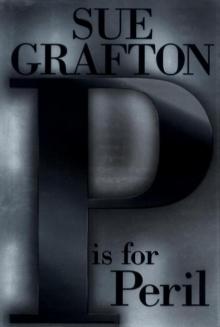 P Is for Peril
P Is for Peril R Is for Ricochet
R Is for Ricochet J Is for Judgment
J Is for Judgment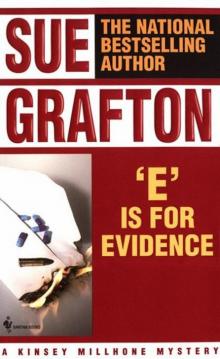 E Is for Evidence
E Is for Evidence T Is for Trespass
T Is for Trespass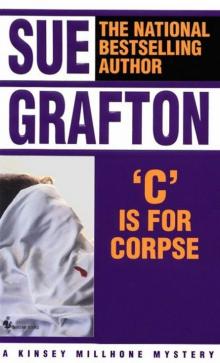 C Is for Corpse
C Is for Corpse U Is for Undertow
U Is for Undertow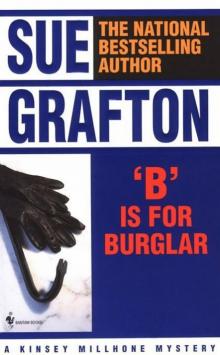 B Is for Burglar
B Is for Burglar Four Sue Grafton Novels
Four Sue Grafton Novels D Is for Deadbeat
D Is for Deadbeat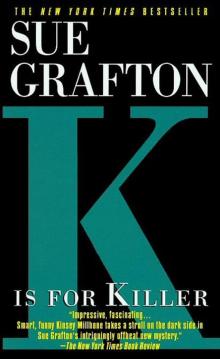 K Is for Killer
K Is for Killer I Is for Innocent
I Is for Innocent A Is for Alibi
A Is for Alibi F Is for Fugitive
F Is for Fugitive Q Is for Quarry
Q Is for Quarry W Is for Wasted
W Is for Wasted Kinsey and Me: Stories
Kinsey and Me: Stories L Is for Lawless
L Is for Lawless Y Is for Yesterday
Y Is for Yesterday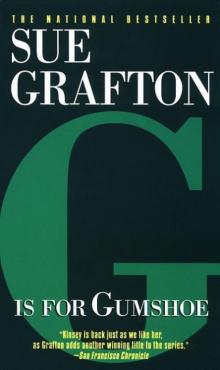 G Is for Gumshoe
G Is for Gumshoe O Is for Outlaw
O Is for Outlaw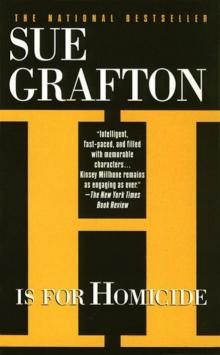 H Is for Homicide
H Is for Homicide X
X N Is for Noose
N Is for Noose Three Complete Novels: A Is for Alibi / B Is for Burglar / C Is for Corpse
Three Complete Novels: A Is for Alibi / B Is for Burglar / C Is for Corpse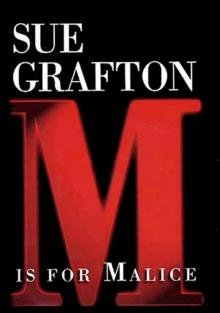 M Is for Malice
M Is for Malice I is for INNOCENT
I is for INNOCENT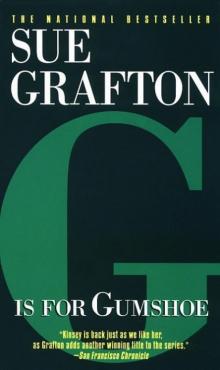 G is for GUMSHOE
G is for GUMSHOE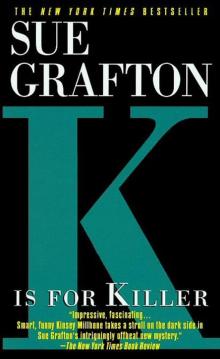 K is for KILLER
K is for KILLER S is for SILENCE
S is for SILENCE N is for NOOSE
N is for NOOSE D is for DEADBEAT
D is for DEADBEAT V is for Vengeance
V is for Vengeance U is for Undertow
U is for Undertow W Is for Wasted km-23
W Is for Wasted km-23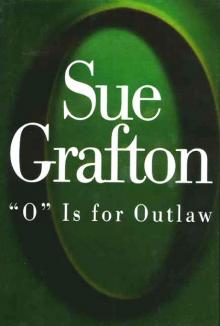 O is for OUTLAW
O is for OUTLAW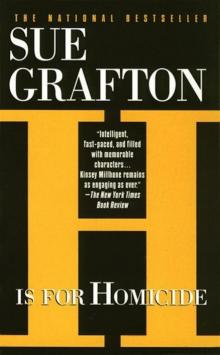 H is for HOMICIDE
H is for HOMICIDE Sue Grafton Novel Collection
Sue Grafton Novel Collection Kinsey and Me
Kinsey and Me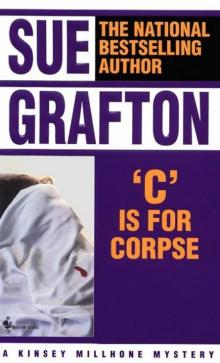 C is for CORPSE
C is for CORPSE F is for FUGITIVE
F is for FUGITIVE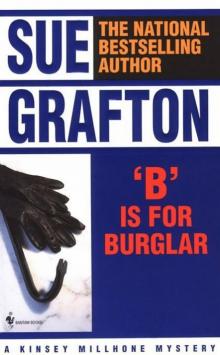 B is for BURGLAR
B is for BURGLAR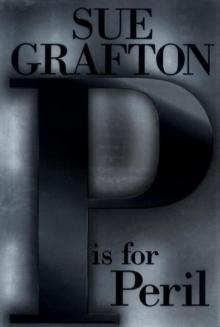 P is for PERIL
P is for PERIL A is for ALIBI
A is for ALIBI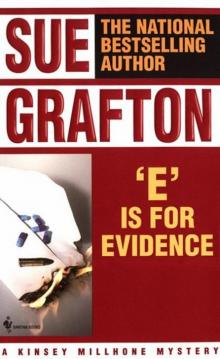 E is for EVIDENCE
E is for EVIDENCE J is for JUDGMENT
J is for JUDGMENT Q is for QUARRY
Q is for QUARRY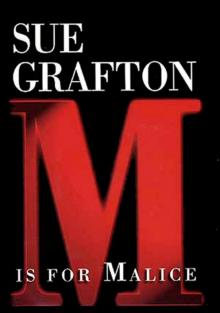 M is for MALICE
M is for MALICE L is for LAWLESS
L is for LAWLESS